|
|
|
Sort Order |
|
|
|
Items / Page
|
|
|
|
|
|
|
| Srl | Item |
| 1 |
ID:
089476
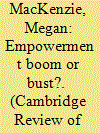

|
|
|
|
|
| Publication |
2009.
|
| Summary/Abstract |
Over the past decade, the term 'empowerment' has been generously employed and woefully ill-defined. In particular, women's empowerment has been embraced by such a vast number of development actors that it appears to be a unifying mission within development. Despite the boom in women's empowerment initiatives, there remains little critical analysis of the use of empowerment in general, and the perceived success or failures of specific empowerment initiatives. Using the disarmament, demobilization and reintegration process in Sierra Leone as a case study, this paper examines how reintegration was described as a source of empowerment for women. Drawing from interviews and analysis of related policy discourses, it is argued that, rather than representing a radical shift in development approaches towards more inclusive and representative policies, empowerment projects are shaped by neoliberal ideas such as individualism, responsibility and economic order and carry implicit, gendered and disciplining messages about appropriate social behaviour.
|
|
|
|
|
|
|
|
|
|
|
|
|
|
|
|
| 2 |
ID:
171835
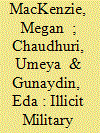

|
|
|
|
|
| Summary/Abstract |
How can we understand consistent public support and trust of the military even in climates of high rates of public awareness about military sexual violence? This article examines how the phenomenon of military sexual violence is mediated to the public through a media content and discourse analysis of newspaper reportage about military sexual violence in Australia. The analysis covers an almost thirty-year period (1989–2016) during which several “sex scandals,” some of international import, broke out. We analyze several frames used to depict the issue and conclude that military sex scandals, like other illicit military behaviors, tend to be publicly framed either as (1) a rarity that is atypical of the institution (“bad apples”) or (2) inevitable and so typical of the institution as to be unremarkable. The article then seeks to demonstrate that these seemingly disparate frames are not contradictory, but rather unify into a singular narrative. The narrative cohering these disparate frames is that military sexual violence is a phenomenon that cannot be prevented or addressed and is therefore unproblematic for the institution.
|
|
|
|
|
|
|
|
|
|
|
|
|
|
|
|
| 3 |
ID:
153109


|
|
|
|
|
| Summary/Abstract |
This article investigates how war and occupation disrupt and produce new gender norms. It explores civilian masculinities and the ways in which masculinities are impacted by conflict and insecurity. Focusing on the West Bank, we argue that insecurity and occupation create the conditions for masculinity nostalgia, or a yearning for a set of gender norms and relations linked to fantasies of a secure, ‘traditional’ and ordered past. Masculinity nostalgia builds on conceptions of thwarted masculinity and the ways in which individuals are held accountable to gender norms. The article draws on interviews with Palestinians to highlight how masculinity nostalgia is associated with three particular identities: father, breadwinner and landowner. We demonstrate that Palestinian civilians lament the ways in which the occupation has impacted men’s ability to fulfil such archetypical identities, at the same time as they reaffirm the value and legitimacy of these identities. We argue that peace and security are often assumed to be dependent upon ‘the return’ of men to their presumed rightful places at the head of households and as economic providers. In turn, masculinity nostalgia emphasizes the ways in which yearnings for peace and security can be interwoven with yearnings for patriarchal gendered orders.
|
|
|
|
|
|
|
|
|
|
|
|
|
|
|
|
| 4 |
ID:
115274


|
|
|
|
|
| Publication |
2012.
|
| Summary/Abstract |
Truth and reconciliation commissions (TRCs) have emerged as an international norm and are assumed to be an essential element of national reconciliation, democratization, and post-conflict development. Despite the increase in the number of TRCs being initiated around the globe and the international consensus regarding their positive effects, there is little understanding of the long-term effects and consequences of TRCs. Specifically, currently there are no established methods or mechanisms for measuring the impacts of TRCs; furthermore, the few examples of efforts to measure these impacts have serious limitations. This article explores both the rise in TRCs as an international norm and the contradictions and inadequacies in existing efforts to measure the impacts and successes of commissions. Through this examination, we aim to demonstrate the need for more critical, interactive, and inclusive mechanisms of assessment for understanding the effects of TRCs. The objective is neither to promote nor to criticize a specific TRC or TRCs in general; however, this article emphasizes the need to think rigorously about how we assess the effects of TRCs and offers insights into the value of more comprehensive mechanisms for assessing the impacts and local perceptions of commissions.
|
|
|
|
|
|
|
|
|
|
|
|
|
|
|
|
| 5 |
ID:
114087
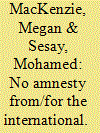

|
|
|
|
|
| Publication |
2012.
|
| Summary/Abstract |
The literature on norms is dominated by debates over the definition of norms, discussion of the evolution of norms, norm diffusion, or norm implementation, and accounts of positive features associated with norms such as cooperation, mutual understanding. This paper argues that "the story" of international norms-or the dominant account of norms-is primarily a white, Western version that assumes that norms emerge from equal exchanges and relationship between states, denying the marked economic and political inequality between global actors and largely disregarding the intense contestations and controls associated with norms. In turn, this paper is an attempt to examine the tensions between so-called international norms and "local" norms and practices as well as the power dynamics and economic constraints that influence so-called global norms. Keeping in mind these tensions between the "story" of international norms and the practical constraints for local actors in the global south, this paper includes uses of the case study of Sierra Leone to examine what happens when "international" norms, such as those associated with transitional justice conflict with "local" norms. Specifically, the local norm of amnesty within Sierra Leone is studied in contrast to the international norm of truth and reconciliation commissions.
|
|
|
|
|
|
|
|
|
|
|
|
|
|
|
|
| 6 |
ID:
088710
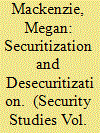

|
|
|
|
|
| Publication |
2009.
|
| Summary/Abstract |
This article focuses on the construction of "soldier" and "victim" by post-conflict programs in Sierra Leone. Focusing on the absence of individual testimonies and interviews that inform representations of women and girls post-conflict, this article demonstrates that the ideal of the female war victim has limited the ways in which female combatants are addressed by disarmament, demobilization, and reintegration (DDR) programs in Sierra Leone. It is argued that titles given to female soldiers such as "females associated with the war," "dependents," or "camp followers" reveal the reluctance of reintegration agencies to identify females who participated in war as soldiers. In addition, I argue that men and masculinity are securitized post-conflict while women-even when they act in highly securitized roles such as soldiers-are desecuritized and, in effect, de-emphasized in post-conflict policy making. The impact of this categorization has been that the reintegration process for men has been securitized, or emphasized as an essential element of the transition from war to peace. In contrast, the reintegration process for females has been deemed a social concern and has been moralized as a return to normal
|
|
|
|
|
|
|
|
|
|
|
|
|
|
|
|
| 7 |
ID:
174716
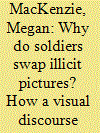

|
|
|
|
|
| Summary/Abstract |
Military service members have been taking and circulating illicit images for decades, and soldier-produced illicit images are a regular and coherent category of international images. Focusing on two case studies – Abu Ghraib images and images of hazing – the argument put forward in this article is that soldier-generated illicit images are not simply photographic evidence, or accidental by-products, of exceptional military activities; rather, these images – and the practices associated with these images – are central to, and reinforce aspects of, military band of brother culture. Soldier-produced illicit images establish a visual vernacular that normalizes particular practices within military communities. Moreover, the practices of producing, circulating and consuming these images convey explicit messages to service members about acceptable behaviour and norms around loyalty and secrecy. A method of visual discourse analysis is developed and employed to examine the acts captured in soldier-generated illicit images as well as the practices linked to the production, circulation and consumption of images. Building on existing work on military culture and images and international relations, this article makes a unique contribution by systematically analysing soldier-produced illicit images in order to gain insights about internal military culture and group dynamics.
|
|
|
|
|
|
|
|
|
|
|
|
|
|
|
|
|
|
|
|
|